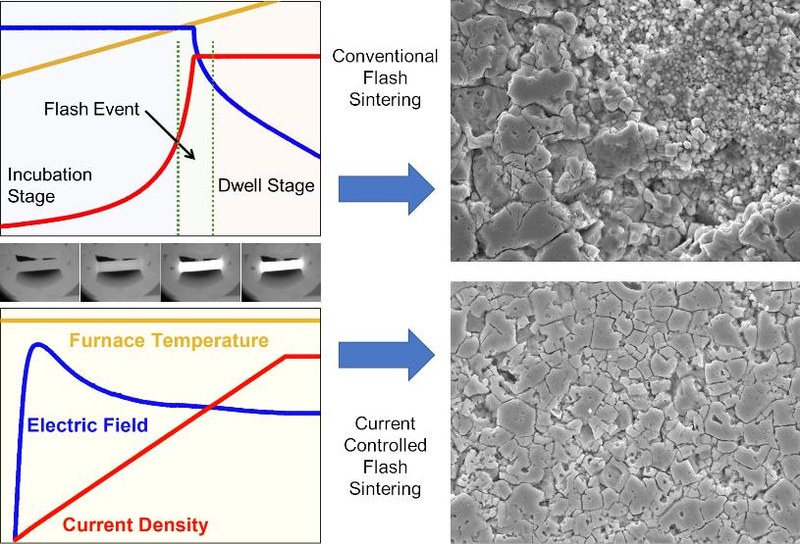Current-controlled flash sintering for ultra-fine control of the microstructure of lead-free ferroelectric perovskites
Jul 04, 2024
Samuel López Blanco defended his thesis on July 3rd on the Campus Nord. Co-advised by Jose Eduardo García and Diego Alejandro Ochoa, the thesis focuses on using current controlled flash sintering to achieve high-density, microstructure-tailored, lead-free ferroelectric perovskite oxide ceramics with enhanced functional response. This approach opens a new pathway for an energy-efficient, environmentally-friendly fabrication of eletronic ceramics
Mass production of ferroelectric polycrystalline materials with varied and exceptional functional properties has allowed the design of an extensive set of electronic devices capable of satisfying a wide demand in many industrial sectors and public consumption. However, the conventional sintering route is currently facing global restrictions due to its high energy consumption and environmental impact. Furthermore, ferroelectrics that currently dominate the market, such as lead zirconate titanate, face global restrictions due to the toxicity of lead, both in the production and recycling processes. Therefore, there is an urgent need to develop lead-free ferroelectrics that require low energy for mass production but with functional properties similar to the traditional materials. Flash sintering, a novel electric field-assisted sintering technique, emerges as a promising new approach because it allows to obtain high density ceramics in seconds and at lower temperatures than conventional sintering. Moreover, while the amount of parameters that must be controlled in this technique can be considered high, an adequate adjustment of them allows fine control over the resulting samples’ microstructure. While flash sintering has been used in the literature to obtain a wide array of structural ceramics, its use for sintering functional materials is still moderated, even scarce for ferroelectrics. In addition, reports related to flash sintering of ferroelectric materials are focused on obtaining dense ceramics with appropriate microstructure, but comprehensive studies related to microstructure properties relationship are still lacking.
In this thesis, a comprehensive study of how the flash sintering parameters affect both microstructure and functional properties of dense ferroelectric perovskite oxides is presented. Current profile control during sintering is introduced as a new parameter, which allows obtaining improved microstructure control and enhanced functional response of the sintered samples. We propose this approach opens a new sintering path that is environmentally friendly, low cost, energy efficient and yields extensive control over the obtained samples.

Share: